I’m Glenn Pougnet and this is #MYCHARITY
This week for the #MYCHARITY interview series, we speak to Glenn Pougnet, Director at StreetSmart, a charity that aims to support homeless organisations by providing the most personal and effective care for individuals in need.
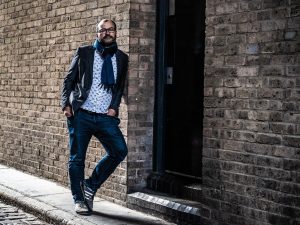
Location: London
Current job: StreetSmart Charity Director
One word that best describes how you work: Juggling
Your biggest success: Raising £7 million for the homeless
Your greatest fear: Being lonely
Your biggest dream: Opening the batting for ENGLAND
Your favourite movie: Bladerunner
Your role model: My grandmother
First of all, tell us a little about your background and how you got to where you are today.
I was born and raised in Essex, a mixed-race family, the first member in my wider family to go to University. Growing up in the eighties, I hated seeing inequalities not just being tolerated but lauded as a good thing. I worked in Publishing for 13 years until I took over at StreetSmart in 2006 despite not knowing much about fundraising or homelessness. Been blagging it ever since.
Tell us more about StreetSmart and what has been the impact of the pandemic on your workday?
We are a small team that run a successful fundraising campaign working with restaurants, pubs and hotels during the build-up to Christmas. The pandemic greatly affected the hospitality industry and therefore frustratingly for us it meant a huge reduction (approx. £500,000) to the funds we raised. Although communication with the team and participants was relatively easy to maintain we struggled to implement the physical aspects the campaign requires – deliveries of collateral, visits to promote. We are all very much people persons so we’ve missed that day to day contact and the constructive mixing of business and pleasure over lunch.
How much digitalisation has helped the charity sector and StreetSmart in these difficult times?
Huge help when it comes to communication and getting our message out. It has also helped when looking at alternative ways of fundraising We’ve tapped into the food delivery boom and had successful online raffles and virtual cook along.
StreetSmart has incredible partnerships with some of the best restaurants in London and the UK, how challenging has been to grow so quick?
We’ve been around since 1998 and started with 30 restaurants so I would say it’s been a steady growth to now 600+. Some of that growth has been organic – owners expanding, chefs from established restaurants setting up on their own but bringing StreetSmart with them. High staff turnover in hospitality means keeping a good, up to date contact list is important in order to help maintain those prized relationships with supporters. Also, the key to our growth has been our sponsors – LandAid who cover all our central costs and make it possible for us to plan properly for the years ahead which is gold dust in these uncertain times.
Can you share a few tips StreetSmart has used to create such an incredible cause/brand awareness?
Keep it simple – It‘s a great idea for the right cause at the right time of year. We’ve tried to keep it consistent and sustainable and never getting greedy and I think the industry has responded to that. Good media partner support and respected industry endorsements have helped create a strong and trusted brand.
In your opinion, which digital channel is working best to communicate to your donors/supporter?
That’s probably Instagram now given the foodie world we operate in.
How do you recharge? What do you do when you want to forget about work?
Play with my twin toddlers although that’s like another exhausting job so hardly unwinding. I like cooking although the lockdown has exhausted my repertoire, I still find chopping vegetables therapeutic.
What are you currently reading, or what’s something you’d recommend?
Grace Dent’s book HUNGRY
Fill in the blank: I’d love to see _____ answer these same questions.
Edmund Elephant from Peppa Pig, he’s a clever clog.
What’s the best advice you would give to Millennials who want to approach the non-profit sector?
Learn a bit about business first – the best organisations and individuals I’ve encountered in the sector have some business acumen and operate efficiently. Add flair and enthusiasm to that grounding and you’ll make a difference, who knows you may even make the world a better place. You don’t necessarily have to think out of the box – as so many problems just require a better box.
You can follow @StreetSmartuk on Instagram
We love to interview charity’s leaders and listen to their work and their way to create great partnerships. If you want to learn more about how your Purpose-Cause match can be effective and well-communicated check how we can help.
I’m Polly Neate and this is #MYCHARITY
This week for the #MYCHARITY interview series, we speak to Polly Neate, Director at Shelter, a charity that helps millions of people every year struggling with bad housing or homelessness through advice, support, and legal services.
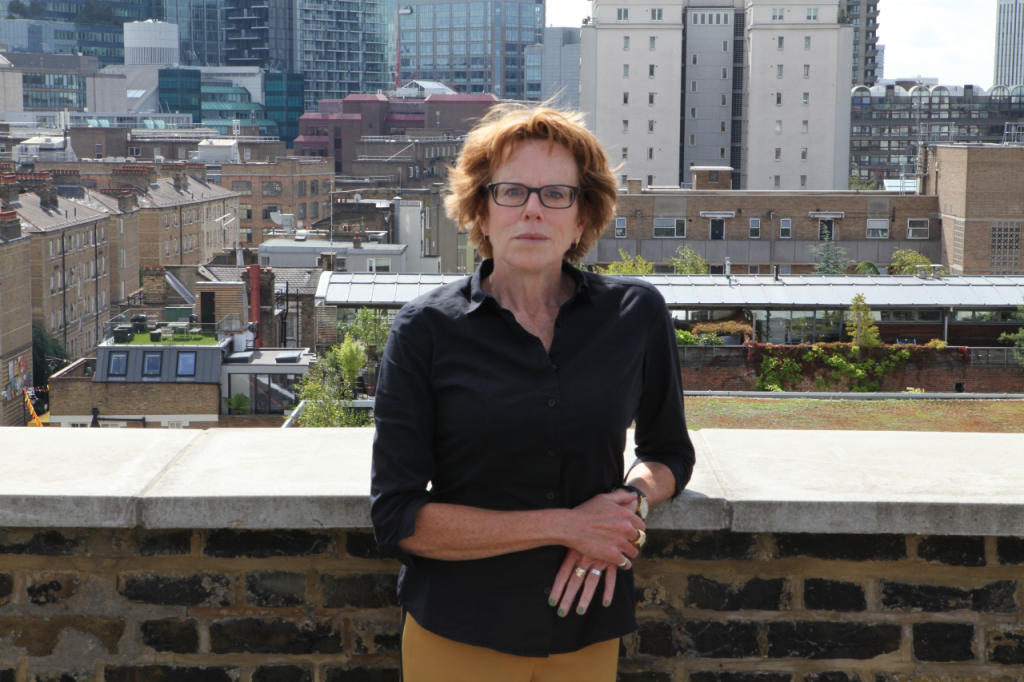
Location: London
Current job: Chief Executive at Shelter,
One word that best describes how you work: Positive
Your biggest success: Times when I’ve been able to use my privilege and influence as a leader to actually change things
Your greatest fear: Big scary looking dogs
Your biggest dream: A generational change in housing policy, which I helped bring about
Your favourite movie: At the moment, Rocks
First of all, tell us a little about your background and how you got into the charity sector.
I started my career as a journalist and specialist early on in social policy. For many years, I absolutely loved journalism, but eventually, I started feeling it wasn’t as much of an opportunity to make a difference as I had once thought. Maybe I got less idealistic, and that’s why I joined the charity sector – which is ironic because I think a lot of people think working in the charity sector must be about as idealistic as you can be!
Tell us more about Shelter and what has been the impact of the pandemic in your workday?
Shelter exists to defend the right to a safe home. We are here to change things for the better by working with individuals, in communities, and across society. I have about 1400 incredibly committed, talented and expert colleagues who make that happen. In terms of the impact of the pandemic on my working day personally, the main thing has been that I have hardly seen a colleague face to face for nearly a year now. I am now missing everyone very badly and struggling to think of ways of being the best leader I can be under these circumstances. It’s also meant some difficult decisions having to be made very rapidly and under a lot of pressure.
How much digitalisation has helped the charity sector and Shelter in these difficult times?
I am very proud of our response to the pandemic, and it would simply not have been possible without our use of technology, from directly providing digital advice to the fact that our telephone tech allows colleagues to answer our helpline from anywhere in the country – or indeed further afield: when the first lockdown started, one colleague was stuck visiting family in Pakistan and answered helpline calls from desperate people facing homelessness in England from his rooftop in Lahore!
Shelter‘s partnerships have the best cause/purpose alignment, can you give quick advice to small charities on how to look for the best partnership ‘match‘?
I think the answer is in your question: if a company or organisation doesn’t share your values and genuinely buy into your purpose, the partnership will be continually strained and may be more trouble than it’s worth if you’re writing a funding proposal that feels like squeezing a square peg into a round hole, thinking again. Having said that, though, for smaller organisations, there often simply isn’t the luxury of avoiding going for every pot of funding you can see. So I would turn the challenge back onto funders: listen to the organisations that really need the money; don’t think you know better than they do; don’t be afraid to fund core costs – if you need a back office, why do you think a charity doesn’t?
How do you recharge? What do you do when you want to forget about work?
I really need to get outside, and I’m probably most relaxed when climbing or on my bike. I think that’s why I’ve been struggling more in Lockdown 3 than in previous lockdowns because the weather has been so awful. Cycling really helps me to reflect. If I have something difficult to think about, it can be resolved by the end of a couple of hours on the bike. Climbing is different because you can only think about what you’re doing. I need both. Recently though, my job has become a lot less creative, and I’ve been having to consume a lot of arid information and make a lot of decisions, and I’ve been missing using my creativity (such as it is!). I’ve been trying to do more writing, and play the piano, to compensate. I am very lucky, though, in that I have a wonderful partner and two brilliant daughters. I love talking to them. And we have enough space to live in. This past year has made me more aware of my own privilege than ever.
What are you currently reading, or what’s something you’d recommend?
When I’m not on holiday, I can’t manage to read anything outside what I have to read for work. It’s a nightmare. And because I couldn’t get away to Ireland last summer like I do every year, I read a tiny fraction of the fiction I would usually read on holiday. So instead, I will recommend what my eldest daughter has been doing during the pandemic. She set herself the challenge of reading every single book by Marian Keyes, and boy did she enjoy it!
Fill in the blank: I’d love to see _____ answer these same questions.
Sarah Hughes CEO of Centre for Mental Health
What’s the best advice you’ve ever received?
My Dad once said: “You’re not special, you’re just lucky”. Accepting that is accepting privilege. And that is a lifelong challenge.
What’s the best advice you would give to Millennials who want to approach the non-profit sector?
Find a cause that matters to you—a lot.
You can follow @Sheltercharity on Instagram.
We love to interview charity’s leaders and listen to their work and their way to create great partnerships. If you want to learn about Brand Strategy and how your Purpose-Cause match can be effective and well-communicated check how we can help.
WGDS is a Digital Agency based in London specialized in optimizing the digital presence of brands and charities.
I’m Louisa Mitchell from West London Zone and this is #MYCHARITY
This week on the #MYCHARITY series, we speak to Lousia Mitchell CEO of West London Zone, a charity offering children and young people access to new opportunities in their community.
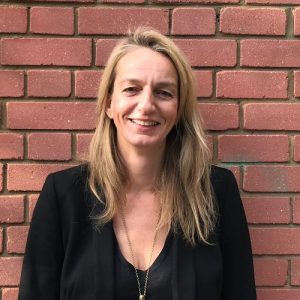
Location: West London
Current job: CEO of West London Zone
One word that best describes how you work: determined
Your biggest success: every child who has overcome a challenge or achieved a goal supported by West London Zone
Your greatest fear: giving up on hoping for a better future
Your biggest dream: that the children and young people we support go on to thrive in adulthood and our west London community becomes a more equitable society
Your favourite movie: Good Will Hunting
First of all, tell us a little about your background and how you got to where you are today.
I started my career in finance. It was a good role for developing my ability to focus, pay attention to detail and work hard, but my heart was never in it. I went on to work in ‘socially responsible investment’, journalism and policy, and it was this plus some travels around the world, that got me into working with children and young people and through which I found what really motivates me, what I feel really passionately about. It’s pretty simple really, I just don’t like unfairness. I can’t bear that some children in our country, which is full of opportunity, are not furnished with the tools to thrive in life and I believe we can change that, with the right support in the right way at the right time.
Tell us more about West London Zone organization and what were the significant changes in your workday during the pandemic?
We are aiming for a west London community where all children and young people have access to the support they need to enable them to overcome challenges and achieve their goals so that they can go on to thrive in adulthood and contribute positively to their community.
We provide a personalised 2-year programme of support for every child we work with using our team of trusted adults – West London Zone Link Workers – who are based full time in a school and know the children really well. They guide and champion each child and are responsible for designing and facilitating each child’s 2-year programme with them, their families and their teachers. Programmes often include specialist support such as therapy, drama, sport and catch up literacy, delivered in partnership with organisations working locally.
During the first lockdown, when schools were closed, we were unable to deliver the specialist support children needed, so our Link Workers shifted to daily wellbeing check-ins and facilitating emergency support as needed – food, technology, paying bills, activity and learning packs in partnership with the schools. By the summer, we managed to mobilise some remote specialist support – therapy, catch up tuition. In the Autumn term, every Link Worker has been in school, guiding the children through the return to school and mobilising as much specialist support as they can to keep the children engaged in school, remaining positive and focused, and addressing their learning loss.
My team is working in very tough and restrictive conditions at the moment, so my job has been to keep us financially robust and to ensure that everyone has the training and support they need to do their jobs well and keep their wellbeing in check. For example, all Link Workers were trained in trauma-informed practice before they return to school in September and have additional clinical supervision this term. I have never been more proud of my team, every single person at WLZ has demonstrated an extraordinary commitment to getting children and families what they need this year and empowering them to take ownership of their futures in an increasingly difficult landscape.
What are the main changes in the charity sector following these difficult times? How digitalization can help?
We have had to adapt quickly again and again in order to provide what children and families need in a constantly changing environment. We are a small organisation so we can be nimble, and our model is to provide personalised support for every child – and every child is different. So we were naturally able to pivot and provide what they needed in a new environment. My team showed extraordinary adaptability as we gripped how to work with new tech platforms and how best to communicate with each and every child and family. We also have a diversified funding model and are deeply embedded in schools and working in partnership with other local organisations and services, so those partnerships held us in very good stead.
But the pandemic has put the charity sector under enormous pressure as the demand for services is rising all the time, but fundraising opportunities have been lost. I fear that this situation will continue to escalate for many months, years yet and I am constantly trying to look and plan further and further forward to ensure our sustainability while also having to adjust and adapt daily in the here and now. Technology is a massive help, but it isn’t the whole answer. For example, we have had to make group tuition and other sessions smaller and shorter for the children to keep them focused and make the most out of each session, so it’s difficult to get them all the support they need.
West London Zone has many partnerships with businesses and charities, how challenging is to align your cause with a purpose?
I always say that ours is a very practical model of support. We operate according to the principles of ‘Collective Impact’. For us, partnership is not me, as the CEO, sitting around a table with other CEOs talking about how we might strategically align our organisations – although that’s important too – it’s about practically bringing people together, on the ground around individual children, one child at a time.
Our focus is the children. Every person and every organisation involved in our network is focused on the children and therefore wants the best for every child. We have learned over the years that if we keep that focus, it is not challenging to align. It’s when other things get in the way that challenges arise. And when that happens, we have learned to drill down to the individual child or children involved, and then we can nearly always get there.
How do you communicate to your donors/followers a partnership on your digital channels?
We are very relational in our approach to all our work – it’s one of our values. So our delivery model is all about relationships, and that spills across to all our work that supports that delivery. We have always done lots of meetings, school visits and events with the children, but that has not been possible this year. So we have stepped up our virtual communication – through video briefings including a range of team members, and more regular written comms via our ‘insight of the month’ newsletter and a more systematic approach to how we communicate on social.
How do you recharge? What do you do when you want to forget about work?
I’m not very good at forgetting about work. My whole team is incredibly dedicated and works very hard. We are all passionate about what we do and I love the fact they send me podcasts, videos, articles and books on social justice issues because they care so much. I’m not sure if listening to or reading those counts as recharging. I often listen to them when running or walking. I like to be active and the increased number of hours at the computer over recent months has been challenging for me – while I am indebted to Zoom and Google hangouts and Teams and so on, I don’t enjoy using them one bit! Aside from that, meals, games and outdoor activities with my family are the times I guess I really forget about work. I learned early on when my own children were young that whatever else is going on, when you are with them, you need to be mentally and emotionally present…because you get back what you put in. They are my greatest battery re-charger and inspire me daily…and sometimes they are my greatest exhaustion!
What are you currently reading, or what’s something you’d recommend?
During the first lockdown, we set up a West London Zone book club to provide the team with some relaxation and social activities. Books have been around the theme of inclusion as we work hard to ensure that the values we adopt in our work with children and families every day drive towards inclusive practice and we need to translate those across the whole organisation too. The latest book was Queenie by Candice Carty-Williams which gripped my attention with some brilliantly unexpected twists in the plot.
Fill in the blank: I’d love to see _____ answer these same questions.
I am continually impressed by so many of the people I meet who are trying to develop the systems we need to support children well in this country, particularly those trying to adopt a collective impact and deep partnerships approach. In particular, Ed Vainker, CEO of Reach Hub Feltham continually inspires me. As do many of the headteachers I meet in our Zone – too many of them to name but their dedication and commitment is incredible. As do my West London Zone Link Workers – again too many of them to name, but Farial Missi, our Deputy Head of Link Work who was one of our first Link Workers back in 2015 is an inspiration to us all at WLZ on a daily basis.
What’s the best advice you’ve ever received?
My father worked incredibly hard his whole life and he used to cite the wartime quote: ‘Time spent in reconnaissance is rarely wasted’. I think it’s another way of saying: ‘It’s all in the preparation’. I do believe in luck, but I also believe in preparing for every meeting, every eventuality and in forging really strong and positive relationships. If you do that and you work hard, you can be pretty sure you will be ready to never waste an opportunity. I can’t bear a wasted opportunity.
What’s the best advice you would give to Millennials who want to approach the non-profit sector?
My first job wasn’t in the charity sector, it was in finance as I’ve explained earlier. Although I didn’t love it, it furnished me with great skills. I think it’s really useful to go into a first job that is going to provide pragmatic and useful skills to fall back on throughout life and throughout different careers. This might be in the non-profit sector, or might not be. But I also think it’s important to enjoy work, so if you end up in a job you don’t love, you need to find another reason to stay in it and treat it as a stepping stone to a job you really do love. It’s also useful to supplement your life with other things that are going to motivate you and provide you with satisfaction in other ways while you cross that stepping stone. Volunteering can be a really powerful tool for that. If you do embark on a career in the non-profit sector early on in your career, I think it is important to find the cause that really speaks to you as it is a tough career path if you don’t feel wholly mobilised and driven by it every day. But I always remind people that you aren’t necessarily going to love every day at work, whatever you do…so be realistic!
You can follow West London Zone on Instagram @westlondonzone
We love to interview charity’s leaders and listen about their work and their way to create great partnerships. If you want to learn more how your Purpose-Cause match can be effective and well-communicated check how we can help.
I’m Brita from Women for Women and this is #MYCHARITY
This week on the #MYCHARITY series, we speak to Brita Fernandez Schmidt, Executive Director at Women for Women International – UK, a charity organisation helping women survivors of war rebuild their lives.
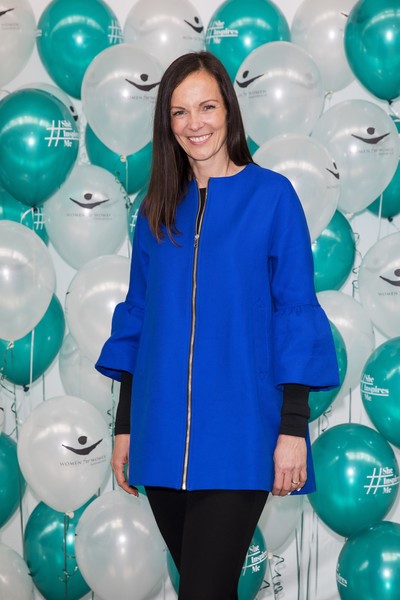
Location: London, UK
Current job: Executive Director
One word that best describes how you work: Inspiring
Your biggest success: Raising money to support Yezidi women, survivors of sexual violence after the 2014 Sinjar massacre in Northern Iraq
Your greatest fear: Allow fear to keep me from pursuing my dreams
Your role model: I don‘t really like the notion of role models. I want us to strive to be our best selves. Instead, I love inspiring women, who inspire me to be my best self. Many of these women are women who have survived conflict and adversity who I have had the honour of meeting through my work at Women for Women International
Your favourite food: Any type of salad with sweet potatoes fries
Your life dream: Inspire women to turn their fears to fierce
First of all, tell us a little about your background and how you got to where you are today.
When I was 14, I moved with my family from Germany to Venezuela and I saw poverty and its impact for the first time. I saw how it proportionately affects women and it ignited a passion within me to do what I can to promote equality and support women all over the world to know their power and uncover their potential. I did a MA in Women’s Studies 25 years ago and decided to work in the not for profit sector, as I saw it as the best fit to realise my purpose. For the past 12 years, I have been working with Women for Women International.
And I am excited to say that I have just finished writing my first book, which is a personal book that focuses on what I have learned about finding meaning, owning your power and transforming your world. It is called Fears to Fierce and is coming out in January 2021 and can be pre-ordered here.
Congratulations on your book, now tell us what makes Women for Women International a successful charity?
Women for Women International is a successful organization because it has staff who are experienced professionals and who care deeply, whether that is in the fundraising offices or in the offices in the countries where we operate our programme. Another reason for our success is our commitment to ongoing learning. We are never complacent, we always ask questions, we always want to know what is working and what is not working. We care deeply about the lasting impact of our work and we don’t shy away from changing track and, importantly, we innovate. We have adopted a permanent start-up mentality which has served us well.
How have you adjusted your working day to this special situation?
After three days of despair, once we had gone into lockdown, we decided that we needed to stop imagining every worst-case scenario under the sun and that we needed to start thinking about: WHAT CAN WE DO? Once we did that, everything shifted. That is the power of good questions, as soon as we started to ask this, answers came flooding in and within 5 weeks we had taken our biggest flagship event – our annual car boot sale – online; which in May raised £77,000. So my lessons learned is: pivot fast, focus on what you can do, fail fast, and don‘t wait to be ready.
What is changing in the charity sector in the pandemic era?
I cannot speak for the whole sector, and I think many of the trends we are seeing are true for the wider world – a drive to digital, working from home etc.
One thing I would like to highlight that has struck me is that NOT giving in to despair has been key – bringing new ideas and initiatives even in these times has been vital to our work and much welcomed by our supporters as a sign that there is hope. So that will be very important, for our work and our supporters!
How do you choose business partners to support Women for Women?
It’s all about shared values and vision! Business partners for us become our family. Whether it is Charlotte Tilbury Beauty, Net-A-Porter or Monica Vinader, everyone no matter where within the business buys fully into our partnership and that is at the heart of our successful collaborations.
Tell us about your favourite case history of the most successful partnership.
It’s so hard to choose. Charlotte Tilbury Beauty, is just incredible because of the size of the commitment and impact, with their £1 million pledge they are having an enormous impact in countries like Rwanda, Nigeria and Northern Iraq. But our partnership with Net-A-Porter has also been simply inspiring – not only has it raised a lot of money but it raises such awareness around the whole world, which is invaluable and cannot be quantified.
How do you recharge? What do you do when you want to forget about work?
I love running, so I do that every morning followed by yoga. And my other way to recharge is to read! I love books and I read all the time.
What are you currently reading, or what’s something you’d recommend?
The best question you could possibly ask me! Ok, so I always read several books all at once. Currently, I am reading What we’re told not to talk about by Nimko Ali; Women don’t owe you pretty by Florence Given, The truth will set you free, but first it will piss you off by Gloria Steinem; Me and White Supremacy by Layla F Saad; Recollections of my Nonexistence by Rebecca Solnit.
Fill in the blank: I’d love to see…
Faith Mwangi-Powell from Girls Not Brides answer these same questions.
Can you give us the golden rule to achieve your goals?
Shine Bright, Breathe and Let go! #FearsToFierce
You can follow WomeforWomen on @womenforwomenuk
We love to interview charity’s leaders and listen about their work and their way to create great partnerships. If you want to learn more if the Purpose-Cause match is effective and well-communicated check out how we can help.
I’m Laura Winningham from City Harvest and this is #MYCHARITY
This week on the #MYCHARITY series, we speak to Laura Winningham, CEO of City Harvest a charity organisation that puts surplus food to good use in a sustainable way.
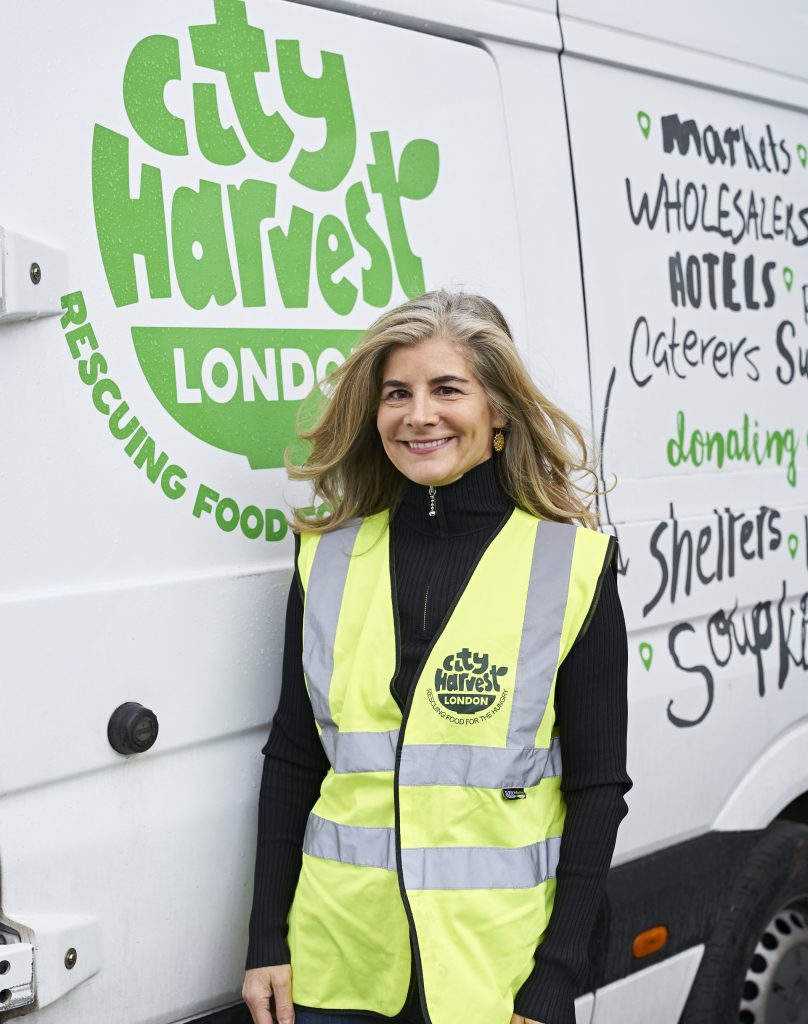
Location: London
Current job: CEO, City Harvest
One word that best describes how you work: Meticulous
Your biggest success: 10 million meals delivered in London, 15,000 tons of greenhouse gases prevented by redistributing surplus food to those in need.
Your greatest fear: Earthquakes—I’ve been in a few.
Your biggest dream: My children thrive and achieve all they set out to do
Your favourite movie: Fargo
First of all, tell us a little about your background and how you got to where you are today.
I’m originally from New York, where I worked in the world of finance, investing in media and telecom stocks at a private investment partnership. I have an MBA from Stanford with a focus on entrepreneurship and had a taste for investing with a purpose, having spent time as an analyst at a socially responsible venture capital fund whilst I was a student. After taking time out of the corporate world to raise twins I decided to move in a different direction. I was aware that in New York and other major cities around the world, there were organisations rescuing fresh surplus food from local businesses that would otherwise go to waste and delivering it to people who needed it most. I believed that there was a large need in London for this type of organisation. We estimate that each month in London food for 13.3 million meals is wasted whilst at the same time 9.2 million meals are missed by people living in food poverty.
Some friends were collecting food from Whole Foods Kensington to help a local church in West London and we decided to test the market, connecting more food businesses and additional charities. We launched City Harvest with an old borrowed refrigerated van and a few early food partners in addition to Whole Foods such as Morrisons, M&S and Charlie Bigham’s. The rest is history. We now redistribute more than 100,000 nourishing meals each week to 300 charities in every London borough.
Take us through a recent workday at City Harvest
City Harvest have doubled in size almost overnight to meet the spiralling levels of hunger that are resulting from the Coronavirus crisis. We’ve delivered almost 1 million meals in the first 6 weeks of the lockdown. We’ve done this with many of our usual team self-isolating and a skeletal team in the office, operating with social distancing. So a recent workday has left very little time for sleep. Our partners, many of whom served community meals to large groups of people have changed format and City Harvest has had to adapt to meet their new need to provide food that is best suited for food parcels and home deliveries. At the same time, the food supply chain is in disarray and we’re adapting to changes on that side of our organisation as well. With a need for more food, we need to educate more food businesses about the importance of donating any surplus food. We’ve needed to train new drivers and get temporary additional warehouse space to stock the growing inventory.
The entire City Harvest team has been extraordinary and heroic. I’m so proud of what they’ve achieved. As one of the founding members of the London Food Alliance, we are working with the Mayor’s office and local boroughs to ensure that all individuals have access to the food that they need during this emergency.
How do you discover new ways to innovate in your working day?
At City Harvest, we’re always reflecting and evaluating the work we do with the ultimate goal of delivering more nourishing meals to more people. We are very data-driven and use our real-time information to evaluate the efficiency of our fleet of food rescue vans, the nutritional content of the food we rescue, and many other metrics to ensure we are efficiently using donor funds to better nourish the community. We have an Impact team that is focused on more qualitative issues. They are speaking with our charity partners, getting a feel for the need in the community and clarity on whether City Harvest is effectively meeting the need of the thousands of men, women and children who have issues accessing food. We always seek feedback from our partners and are eager to hear the stories of the people that are nourished with food from City Harvest. We’re always analysing results so we can improve our outcomes.
What is the next big thing in the charity sector?
The immediate focus for most charities will be to find the support needed to survive in a very challenging social and economic climate resulting from the COVID Crisis. One key will be collaboration- during this crisis, more than ever, I’ve witnessed charities sharing information, ideas, and technology. The ability to rapidly form partnerships has been important in what is essentially a humanitarian food aid crisis in our own backyard. There’s a sense that we’ve gone from nourishing our neighbours to working in life and death situations. Volunteers delivering meals are often the ones to call ambulances to help vulnerable, self -isolating people who have been neglected and malnourished.
How do you choose business partners to support the charity?
Our sustainability goals are aligned with many of the corporate partners with which we work. Our food redistribution work, nourishing people with food that would otherwise go to waste, meets 9 of the UN Sustainable Development Goals such as No Poverty, Zero Hunger and Sustainable Cities.
Many companies want to make a very hyperlocal impact, directly in and around the locations where their employees live and work. City Harvest operates in all London boroughs and we can give each corporate partner a very clear impact report on how we help vulnerable people in their areas. Some companies wish to benefit a specific group such as children, refugees, families, women facing domestic violence, the homeless. City Harvest delivers food to programs that serve almost every vulnerable group.
Companies can send volunteers to help us sort food and deliver to different projects and see the direct impact that they are making. This is a very inspiring experience. We have fantastic partnerships with food businesses, which are at the very foundation of what we do and with others who offer financial support and volunteering to keep our vans on the road delivering food. Companies such as William Blair, Artemis Funds, T Rowe Price and foundations such as Citybridge Trust, Portman Foundation, and the Worshipful Company of Fishmongers and the Grocers have been invaluable to our work. We also benefit from skills-based volunteering, having individuals who are some of the best and brightest in their fields offering us professional services. All of these partners share our interest and passion-getting great quality, nutritious food to London’s most vulnerable.
Tell us about your favourite case history of the most successful partnership.
It’s so hard to choose – City Harvest has more than 300 community partners who receive our free food surplus food deliveries each week. These community meal programs, children’s’ programs, family centres, and elderly drop-in sessions are each doing heroic things that transform lives for the better. Food is a tool they all use to embrace people, bring them in, offer them friendship and other services. We have several partners who we work with on multiple programs like the Mayor’s Fund Kitchen Social, which ensures children have activities and nourishment during holiday periods—times when unfortunately many children in London face adversity. Foodcycle has many hubs around London, and City Harvest delivers food to several of these. I have a special place in my heart for Choir with no Name which brings vulnerable, homeless people together for a weekly choir rehearsal and during the holidays does wonderful performances throughout London. City Harvest delivers the ingredients that enable more than 80 people to have a wonderful vegetarian meal weekly after theses rehearsals.
Our partnerships with restaurants, supermarkets, manufacturers, events companies and others make what we do possible. We look forward to annual events in London which choose to give us really special surplus food donations—Wimbledon, RHS Chelsea Flower Show, and the International Food & Drink Event. And we value our partnerships with New Covent Garden market and New Spitalfields Market since we focus on fresh nutritious food—35% of the food we deliver is fresh fruit and vegetables. Supermarkets like Whole Foods and Morrisons have been great supporters and manufacturers of nutritious meals like Charlie Bigham’s have been so important to nourish the community.
How do you recharge? What do you do when you want to forget about work?
Leading a food redistribution charity during an emergency food aid crisis leaves little time to switch off. It definitely involves lots of sacrifice on the part of our entire team! I’m sure this is true across all charities. What drives this hard work is a sense of pride in what we all accomplish each day. I read several books each week and because gyms are currently shuttered due to coronavirus risks, I am benefiting from fantastic streaming Pilates classes from my favourite studio (heartcore.co.uk) which I squeeze into my schedule. I have zoom calls with old friends based all over the world and most importantly, find time to laugh—having identified several streaming shows to watch with my husband and twins that offer a complete distraction from the challenging issues in the world today.
What are you currently reading, or what’s something you’d recommend?
I usually read an eclectic combination of books at any one time, a mix of fiction and non-fiction, and have a monthly book group (now on zoom!). I’ve recently read The Feather Thief, The Salt Path, The Dutch House and I’m about to start The Mirror & the Light,
Fill in the blank: I’d love to see _____ answer these same questions.
I’ve met so many inspiring people in this sector recently, of whom I’d love to ask all these questions! Since City Harvest delivers food to more than 300 community organisations, I’m continually impressed by the individuals I see working so hard to make such a great impact. Louisa Mitchell, West London Zone, Louise Holstein, Mike’s Table, Mary McGrath, Foodcycle, Dee Woods at Granville Community Centre and Dan Atkins, Buses4 Homeless are just a few of the people who I find very impressive. We also collect food from hundreds of companies and I meet so many people who are doing impressive things and supporting City Harvest in the process. Emilie Vanpoperinghe, founder of Oddbox and Ali Warburton founder of POW foods are two who come to mind.
What’s the best advice you’ve ever received?
I’m a keen believer in paying it forward. City Harvest has been successful because of the tremendous support of so many different partners and stakeholders and we try and take a very collaborative approach, passing on the goodwill we’ve been so fortunate to receive to others. Over the years, we’ve been given a tremendous amount of advice from the CEO, Lori Nikkel, of Second Harvest in Toronto. She responds to every query with incredible speed and with thoughtful responses. So we are thrilled when people ask City Harvest for guidance on how to start a food rescue organisation and we can pay it forward. We often get calls from other cities and countries and we’re thrilled to share our knowledge and learnings.
You can follow City Harvest on Instagram @cityharvestlondon
The WeGiveIt #MYCHARITY series asks heroes, experts, and leaders to share their ambitions, routines and more and it’s published on WeGiveI Blog.
We love to interview charity’s leaders and listen about their work and their way to create great partnerships. If you want to learn more if the Purpose-Cause match is effective and well-communicated check out how we can help.
WGDS is a Digital Agency based in London offering Digital Brand Strategy, Google data analysis, Marketing Strategy and Cause Marketing Plans.
We are specialized in optimizing the digital presence of brands with purpose and charities.
I’m Susana Prudêncio from Calouste Gulbenkian Foundation and this is #MYCHARITY
This week on the #MYCHARITY series, we speak to Susana Prudêncio, from Calouste Gulbenkian Foundation.
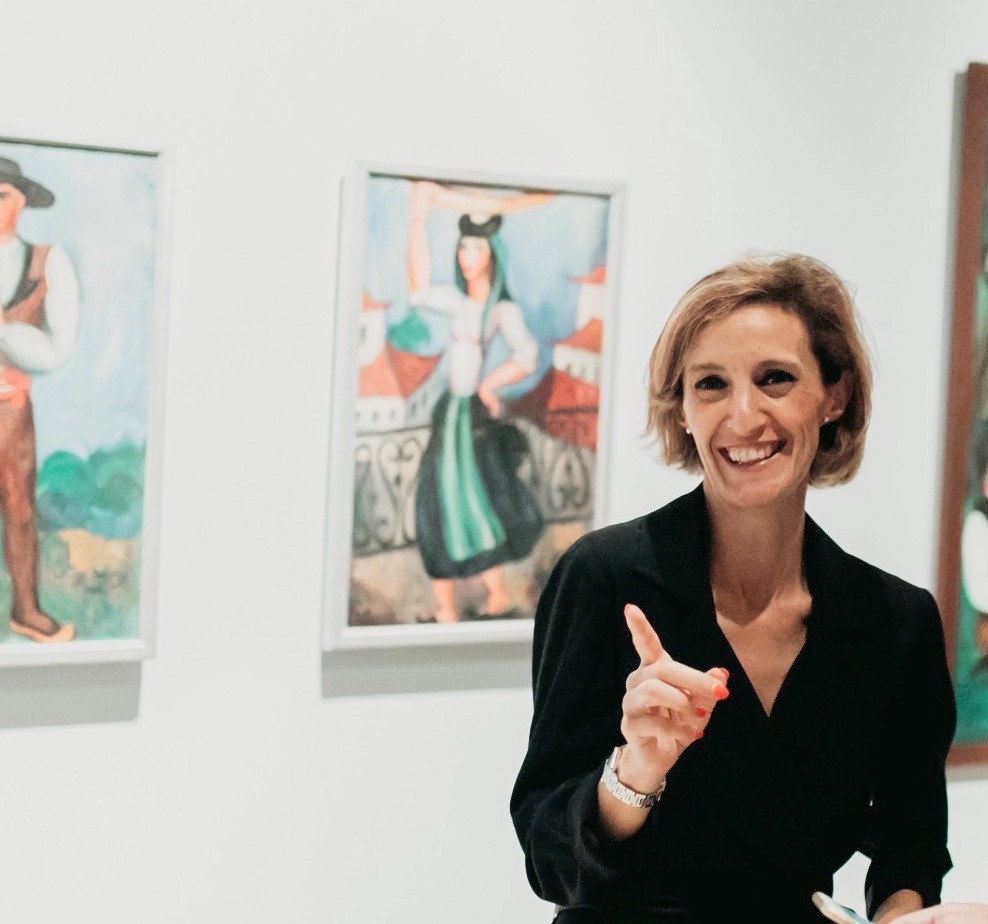
Location: Lisbon
Current job: Deputy Director of Marketing and Digital Transformation at the Calouste Gulbenkian Foundation
One word that best describes how you work: Positivity, I always believe it is possible
My greatest success: two innovative projects that I helped to create more than 20 years ago, that are still in use today, and I am very proud of: the creation of a concept for the stores of the National Museums in Portugal and the Project «Um Mecenas um Museu» (A patron a museum).
My biggest fear: An empty house
My secret wish: Take the Orient Express or live in Amalfi for a season
My role model: My mother. A wonderful human being.
My favourite website: Barbican
First of all, tell us a little about your background and how you got to where you are today.
My career started at the National Gallery in Washington where I had the chance to learn from the best and to see how a big museum is managed. Then I moved back to Portugal and I worked at several cultural institutions such as the National Museums Institute, the Serralves Foundation in Oporto and the Calouste Gulbenkian Foundation, where I’ve been working for 13 years. My work experience has always been very dynamic and encompasses different areas such as corporate partnerships, brand/design and communication activities or the creation of unique experiences in the world of arts for regular visitors and business customers.
Can you explain what is Calouste Gulbenkian Foundation?
The Calouste Gulbenkian Foundation is a wonderful cultural and philanthropic institution. Its founder, Calouste Gulbenkian, was a very wealthy businessman and art collector, whose concern about the fate of his art collection during World War II motivated his desire to move to the United States. Fortunately, he stopped in Lisbon on his way and changed his mind. He spent the last years of his life in Portugal and decided to create, by will, a foundation to which he would bequeath his fortune and art collection.
The Foundation aims to improve people’s lives through art, education, science and charity. In addition to the headquarters in Lisbon, it also has delegations in London and Paris, places where Gulbenkian lived.
What does it mean for you Digital Transformation?
I see Digital Transformation as our full adaptation to the technology-based world where we are living today. From storage to equipment, from productivity tools to digital campaigns, the digital transformation affects both internal processes, namely the working environment, but also external processes, such as communicating to our audiences.
In which way is Calouste Gulbenkian Foundation is embracing the digital revolution?
The high level of digital preparation of our organization has radically changed in the last years and has been proved to be especially important during this pandemic. It has allowed us to keep our daily work in the safety of our houses, without significant disruption.
We have developed a strategy related with the development of platforms and digital contents that allowed us to keep connected with our audiences by providing relevant and up to date content; live-stream concerts, conferences, guided tours, conversations with curators at home, challenges on social networks, among many other actions. Art is useful and it is revealing its importance in people’s lives right now. Have you noticed the number of people sharing works of art and experiences with works of art lately?
How do you discover new ways to innovate in your working day?
I try to be up to date by following the work of cultural institutions of reference, I am “connected” and attentive to new trends. In our team, we have very young people that keep challenging me.
Can you tell us a key lesson you have learned along the way
Observe, listen to others, listen to the heart and common sense.
How do you recharge? What do you do when you want to forget about work?
I am a big fan of walking, I love to sunbath and swim in the ocean.
What would you have done differently if you knew then what you know now?
I don’t have time for regrets ?. I am always focused on the present moment and future achievements.
Finally, as Calouste Gulbenkian Foundation has an incredible art collection, which one is a breathtaking piece that people can’t miss?
It is extremely hard to highlight one piece of art in such an extensive collection, which goes from ancient Egypt to the 20th century. I like many of the artistic periods covered and its major artists like Rembrandt, or Turner. Nevertheless, if I had to choose, I would probably follow my emotions and pick the Francesco Guardi room. I already liked this room before working at the Foundation. For me, it is a magical place, with a considerable number of paintings illustrating the 18thcentury Venice. The paintings portray the beauty of the city, from the Grand Canal to Giudecca. The most glamorous it is the one that depicts the Feast of the Ascension in St Mark’s Square.

The light, the ambience, the movement, the dresses, everything entice us and take us to that place. I close my eyes and I am momentarily transported to the arcade of the Florian café, having some wine and laughing with loved ones. This room makes me happy! Isn’t that the good thing that art gives us?
You can follow the Calouste Gulbenkian Foundation on Instagram at fcgulbenkian
The WeGiveIt #MYCHARITY series asks heroes, experts, and leaders to share their ambitions, routines and more and it’s published on WeGiveI Blog.
I’m Mark Curtin from The Felix Project and this is #MYCHARITY
This week on the #MYCHARITY series, we speak to Mark Curtin, CEO at The Felix Project, a charity that prevents food waste and works to eradicate food poverty and hunger.
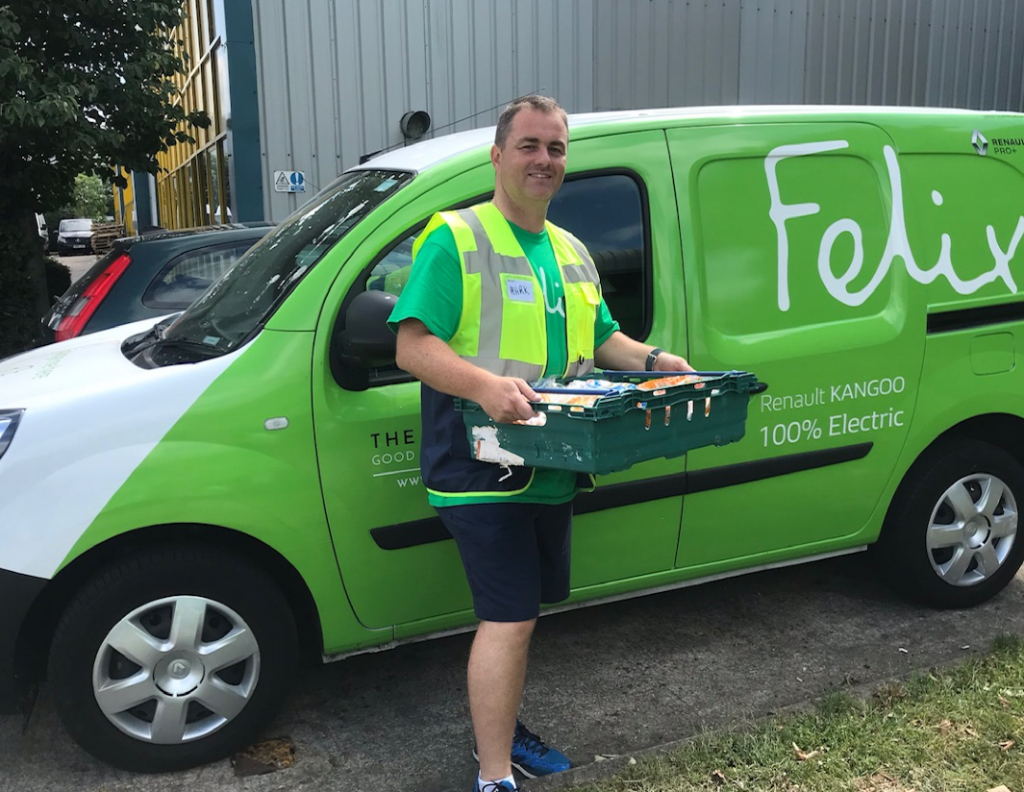
Location: London
Current job: CEO at The Felix Project.
One word that best describes how you work: Teamwork
Your biggest success: Personally – My children.
Your biggest success: Professionally – leading my team during COVID19 crisis.
Your greatest fear: Forgetting to recognise everyone’s efforts.
Your biggest dream: My children achieve everything they want to.
Your favourite movie: Star Wars IV, A new hope.
First of all, tell us a little about your background and how you got to where you are today.
I come from a fairly working-class family from North London and later Milton Keynes. Then, I started in professional sport, playing football, then coaching, which took me overseas to the U.S. for a while. Later, I worked in Further Education and then Sport for Development for over 10 years, before several senior management roles in various Education and Children’s charities. In July 2019 I became CEO at The Felix Project, a charity that prevents food waste and works to eradicate food poverty and hunger in London.
Take us through a recent workday.
Since the outbreak of COVID19, I am working very closely with all teams, ensuring we are responding and adapting to the fast-paced environment that we operate within. I deal with the media and a huge range of very grateful donors and supporters who are working to help us. My main priority to work closely with my teams, many of who are now working remotely to discuss work, assess situations, analyse the impact on our work and make decisions with the team to have maximum impact. I also prioritise saying well done and thank you and making sure everyone is safe and healthy. I tweet, post and communicate via social channels a great deal and generally find every day is quite different at the moment.
How do you discover new ways to innovate in your working day?
I ask the very talented and clever people I am surrounded by, I listen, I observe and I learn… then I apply what I think works best for what we are trying to achieve.
What is the next big thing in the charity sector?
Embracing the learning and requirements to adapt and change during the COVID19 crisis, the best charities will thrive if they can innovate, adapt to whatever becomes the new world we operate within and remove any out of date practices and approaches
How do you choose business partners to support the charity?
One simple question – Will they enable us to achieve our mission?
Tell us about your favourite case history of the most successful partnership.
Not sure we have a favourite one as many businesses work very well for us in different ways. But those partners who engage with us in multiple ways, helping us to tell our story, developing and improving our organisation, bringing their people to work with us through volunteering or other opportunities and helping us to achieve our mission and reach our goals are always the best!
How do you recharge? What do you do when you want to forget about work?
Spend time with my wife and children. I also like to run or get out on my bike. I am known to frequent the Emirates stadium very regularly too to watch my beloved Arsenal!
What are you currently reading, or what’s something you’d recommend?
I haven’t had the time to read a book recently, but my all-time favourites are Black Box thinking by Mathew Syed, Creativity Inc by Ed Catmull or for a bit of light relief and something from my childhood William Golding’s brilliant Lord of the Flies. I would also say watch any Sir Ken Robinson TedTalk!
Fill in the blank: I’d love to see _____ answer these same questions.
Neil Purcell, CEO at Talent Works International or Mike de Giorgio Founder of Greenhouse Sports.
What’s the best advice you’ve ever received?
Make sure you are never the smartest person in the room, surround yourself with the best talent and always listen more than you speak when in a leadership role.
You can follow The Felix Project on Instagram @thefelixprojext
The WeGiveIt #MYCHARITY series asks heroes, experts, and leaders to share their ambitions, routines.
We can help businesses and charities to optimize their Cause Marketing, enhance their Brand Presence and give targetted education with our Marketing Workshops.
I’m Clara Widdison from Mayor’s Fund for London and this is #MYCHARITY
This week on the #MYCHARITY series, we speak to Clara Widdison, from Mayor’s Fund for London, the charity who support young Londoners and promotes the activities which best increases their opportunities. The Mayor of London, Sadiq Khan, is their patron.
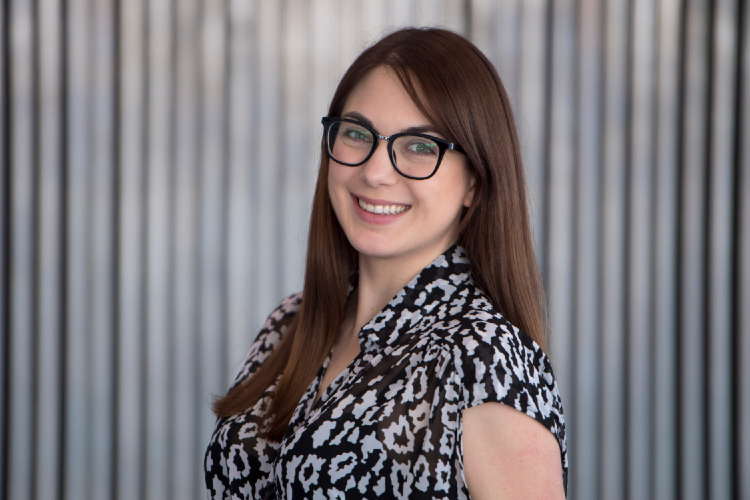
Location: London
Current job: Kitchen Social Programme Manager at Mayor’s Fund for London
One word that best describes how you work: Commitment
Current mobile device: Samsung Galaxy S10
Favourite website: Imgur.com
First of all, tell us a little about your background and how you got to where you are today.
I knew that I wanted to work in food when I left University, but I had no idea what roles were available or what my skill set would suit. I felt around blindly for many years – running a cookery blog, volunteering at food charities or coops and applying for jobs that seemed like they might be the right ‘fit’ (they weren’t!). Through a process of elimination, I understood what it was that I loved to do and how I could do it. One day I saw an article in a newspaper about a new social enterprise in the food sector. I rang them up and said ‘I have to work for you!’ That job changed my life.
Take us through a recent workday.
Kitchen Social is a pan-London program organised by Mayor’s Fund in response to holiday food insecurity. We work through one hundred grassroots organizations across London to get nutritious meals and enriching activities to children who may not have either otherwise.
Although this current public health crisis, the Coronavirus crisis, isn’t a school holiday, children from low income backgrounds are still out of school and at risk of hunger and malnutrition. The research we have done suggests that this applies to 300,000 children in London.
That’s why we’re continuing to help children living in food insecure households. At the moment I am speaking to our hubs about developing an emergency response to get food to these young people and their families. We’re also speaking to partners and families about supporting us to achieve this.
On a daily basis, we’re working with the Felix Project, FareShare and City Harvest to deliver food parcels to vulnerable families in London. We’re also working with Thomas Franks to make sure that children have fresh, healthy meals. If you’re keen to help, please consider donating to our appeal here: https://bit.ly/3a74VIp. Your support means that our Kitchen Social hubs can continue to provide packed lunches, hot food for collection & food hampers for those in need.
In the meantime, I am juggling my day job with caring for a toddler, and so the days are pretty manic at the moment!
How do you discover new ways to innovate in your working day?
At Mayor’s Fund for London we are constantly reviewing and reflecting on the work we do and how to improve and develop our model. We do that through feedback from young people and their families, our delivery partners and through engaging with the most up to date research. There isn’t a day that goes by when I am not tinkering with something – I think of myself as a social engineer.
What is the next big thing in the charity sector?
Sustainability! It’s been on the cards for years, but it is something we haven’t fully embraced as an industry. As funding becomes less available and more competitive, a lot of charities are looking for ways to become more self-sustaining. I come from a social enterprise background and I foresee that a lot of traditional charities will start moving into this space in the upcoming years.
How do you choose business partners to support the charity?
A lot of corporate partners want to work with us because we support children in the city in which they are based. We try to work with those who share our passion – getting great quality, nutritious food to children! We have brilliant partnerships with organisations such as Caravan Restaurants, Waitrose, Wahaca and Soho House.
Tell us about your favourite case history of the most successful partnership.
It’s so hard to choose – we really do have wonderful funders and sponsors. The restaurants are always so much fun to work with – they come along to our hubs and cook with our children and it’s an absolute joy to see the young people engage with new foods and the concept of professional cooking, some for the first time. We also have brilliant relationships with the surplus food providers in London, such as City Harvest and the Felix Project. They get great quality food into our hubs, and our hubs turn them into delicious meals for children.
How do you recharge? What do you do when you want to forget about work?
Rarely do I want to forget about work. I went into the charity sector knowing that I would have to sacrifice large pay checks, corporate perks and a glamorous career – instead I get a real sense of joy and pride in what we all do.
Sometimes to destress, I will cook at home, often for friends or family, whilst listening to questionable music very loudly. My toddler is always first in line when I am making banana pancakes.
What are you currently reading, or what’s something you’d recommend?
Nowadays I don’t get much time to read – my toddler sees to that! I have a huge pile of books on my bedside table that I am constantly promising to pick up. My favourite thing to flick through is cookbooks. I don’t follow recipes when I cook, but I love the photography and the inspiring ideas. Plus I can pick them up and put them down without worrying about forgetting the storyline!
Fill in the blank: I’d love to see _____ answer these same questions.
There are so many people in this sector that I find inspiring. It would be great to hear more from the female powerhouses leading the movement for a better food system such as Anna Taylor from Food Foundation , Kath Dalmeny from SustaIn and Kemi Akinola from Be Enriched.
What’s the best advice you’ve ever received?
My former boss gave me so much great advice. He really shaped who I am. One piece of advice that sticks with me is “This too shall pass.” Whenever I have a tough day, I recall this, and I know there is a much brighter one on the way. It seems a fitting piece of advice for our current situation.
You can follow Mayor’s Fund for London on Instagram @mayorsfundforlondon
The WeGiveIt #MYCHARITY series asks heroes, experts, and leaders to share their ambitions, routines and more and it’s published on WeGiveI Blog.
I’m Alex Wallace from Mintridge Foundation and this is #MYCHARITY
The WeGiveIt #MYCHARITY series asks heroes, experts, and leaders to share their ambitions, routines and more and it’s published on WeGiveI Blog.
This week on the #MYCHARITY series, we speak to Alex Wallace, Founder of Mintridge Foundation
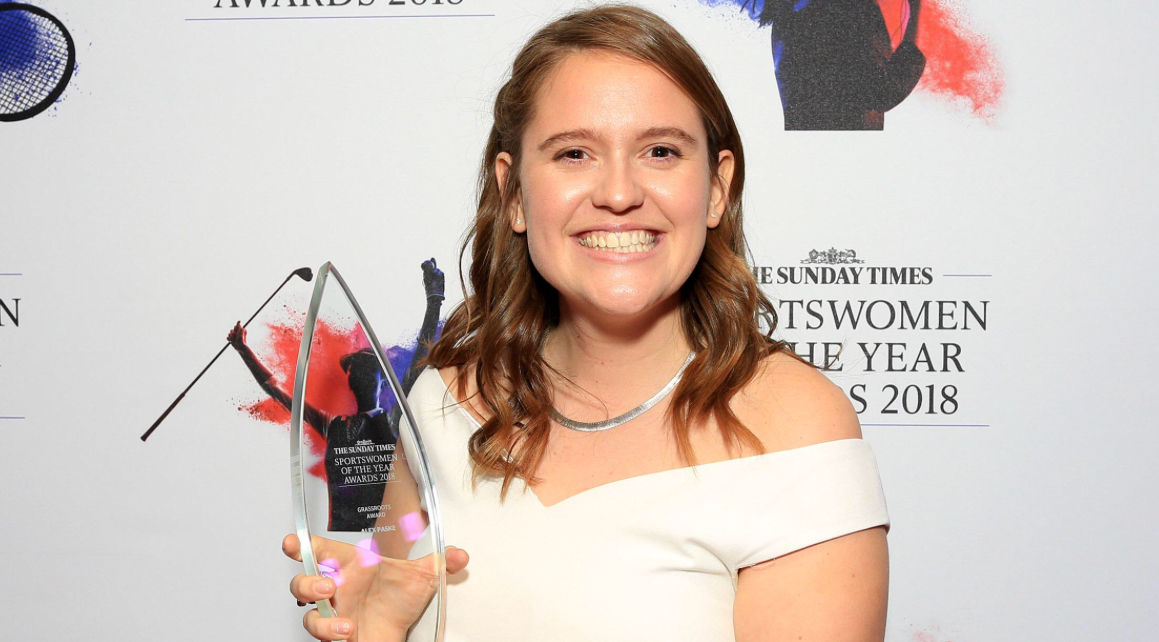
Location: Corby, Northamptonshire
Current job: Founder & Managing Director
One word that best describes how you work: Meticulous
Current mobile device: iPhone 8
Favourite website: https://www.thetimes.co.uk/ , https://herspirit.co.uk/
First of all, tell us a little about your background and how you got to where you are today.
I started Mintridge Foundation five years ago because I needed help myself as a teenager. I was awarded the 2018 Sunday Times Sportswomen of the Year in the Grassroots Category, the Women of the Future Sport Award in 2017 alongside Dr Sarah Leiter, an Associate Fellow of the Royal Commonwealth Society.
First I was a committed hockey player, but missed out on getting into the England team at the final stage. I had a huge crash of confidence and felt my identity was under threat. I really struggled with what I perceived as failure. All I needed was someone to tell me that I deserved to be there.
As a result Mintridge Foundation is now a registered charity, working with over 50,000 young people. We work for enhancing life skills in young people through sport. We provide a support network for young people by harnessing the power of positive sporting role models.
We assists young people of all ages, abilities and physical capabilities to develop confidence and resilience. Moreover we create awareness of the importance of mental and physical wellbeing through sport. Our team of Ambassadors – Olympians, Paralympians and other professional sports work with young people in schools, clubs and academies across the UK. Starting with visits including assemblies, coaching clinics and classroom sessions tailored to each organisation’s requirements, our ambassadors can then provide one- on- one remote mentoring in a safeguarded environment.
Take us through a recent workday.
No work day is the same at the Mintridge Foundation!
Just before 08:30, I caught up with Katie Smith, my colleague who is out. Katie is delivering a Mintridge Bronze programme in Brighton with one of our England Netball Ambassadors. Then I make a phone call with a technology company for an update on progress. We have recently received funding to help improve the quality and safeguarding of the remote element of our programmes.
I soon headed off to a local business to share more about our charitable work to see if we are able to become an official charity partner. I returned to the office to prepare a number of proposals for schools. School are interested in some of our Ambassadors leading a mentoring programme at their venues. A volunteer has recently offered her services for National Workout and Wellbeing Week and we put the final touches together for our Vinyasa Flow fundraising sessions before launching it online.
All before rushing out the door for a game of tennis! Perfection!
How do you discover new ways to innovate in your working day?
I love to share ideas with other individuals and charities in the sector through forums and networking.
What is the next big thing in the charity sector?
Our charity Mintridge Foundation! We are a young organisation that has huge aspirations to be affordable and recognisable to every school in the country. SportValue Bank is going to be incredible for us moving forward to help demonstrate our impact to funders.
How do you choose business partners to support the charity?
Business Partners are selected that share our values in enhancing life skills for ALL young people through a diverse team of sporting role models. We like to be able to work with organisations in whatever capacity they choose, however big or small and we want to be able to support them just as they do for us.
Tell us about your favourite case history of the most successful partnership.
I would say Squadkit has been one of our biggest supporters and corporate partners and, when you see their core values of participation, wellbeing, commitment to yourself and your team-mates, endurance and fun, it’s easy to see why.
To explain better Squadkit is a local business based in Oundle and they are the leading sportswear brand for independent schools nationwide. Therefore, they understand the requirements of growing bodies, specialist kit and (as we’re sure many parents are thankful for) durability. Their kit goes through development and extensive testing with professional athletes (and the washing machine too).
They are really great as they believe in environmentally responsible, ethical trade and hold themselves to very high standards with regards to this. As if that wasn’t enough, Squadkit has now turned their attention to female sports participation, particularly in teenage girls. developing the Limitless sports bra, addressing the issue of high numbers of teenage girls dropping out of sport.
Through our partnership, we have been able to impact 2,052 students in thirteen different schools since March 2019 delivering our Silver and Bronze programmes with a wide range of athletes, including tennis ace Jade Windley, netball superstars Pamela Cookey and Eboni Usoro Brown, diving Olympian Becky Gallantree and Paralympian archer Danielle Brown. Our partnership in Squadkit Scholarship Programme deliver Squadkit core values and corporate social responsibility, as we move into 2020, with their new Ambassador Programme too!
Because Squadkit has done a huge amount for Mintridge, we are incredibly grateful. If you have seen our new, redesigned logo and website, this is thanks to Squadkit.
How do you recharge? What do you do when you want to forget about work?
Mostly I find it very difficult to relax, I have lived and breathed the world of Mintridge for the last 5 years and I am so passionate about it, I therefore really struggle to switch off.
As all of our elite athlete Ambassadors tell us on a regular basis, they schedule R&R into their training schedules, and they wouldn’t be able to compete and succeed at the very top without it.
Therefore, I am taking their advice and gathering perspective – being as kind to myself as I am to others by:
Spending quality time with the supporting people that I surround myself with.
I take my 3-year-old nephew to football every Monday as the little things are the very important things and they keep me energised.
I play tennis at a local club.
I cycle and run without the use of apps (I put too much pressure on myself with PBs otherwise!).
I love doing a SuDoku in the evening to remove the temptation of overusing technology.
I enjoy a few glasses of wine with good friends!
What are you currently reading, or what’s something you’d recommend?
Probably I would choose Love for Imperfect Things: How to Accept Yourself in a World Striving for Perfection and Mud, Maul Mascara: How I Led My Country and Lived to Tell the Tala
Fill in the blank: I’d love to see ______ answer these same questions.
Because I admire her, Sophia Giblin, Clear Sky Charity
What’s the best advice you’ve ever received?
Above all my favourite is “Find something that is more important than you and devote your life to it.” by Pinky Lilani CBE DL
We can help you to optimize your Cause Marketing, enhance your Brand Presence and give you targetted education with our Marketing Workshops.
I’m Charlie Hay from Afrikids and this is #MYCHARITY
The WeGiveIt #MYCHARITY series asks heroes, experts, and leaders to share their ambitions, routines and more. It’s published monthly at www.wegiveit.co.uk/blog
This week on the #MYCHARITY series, we speak to Charlie Hay, Ceo of Afrikids
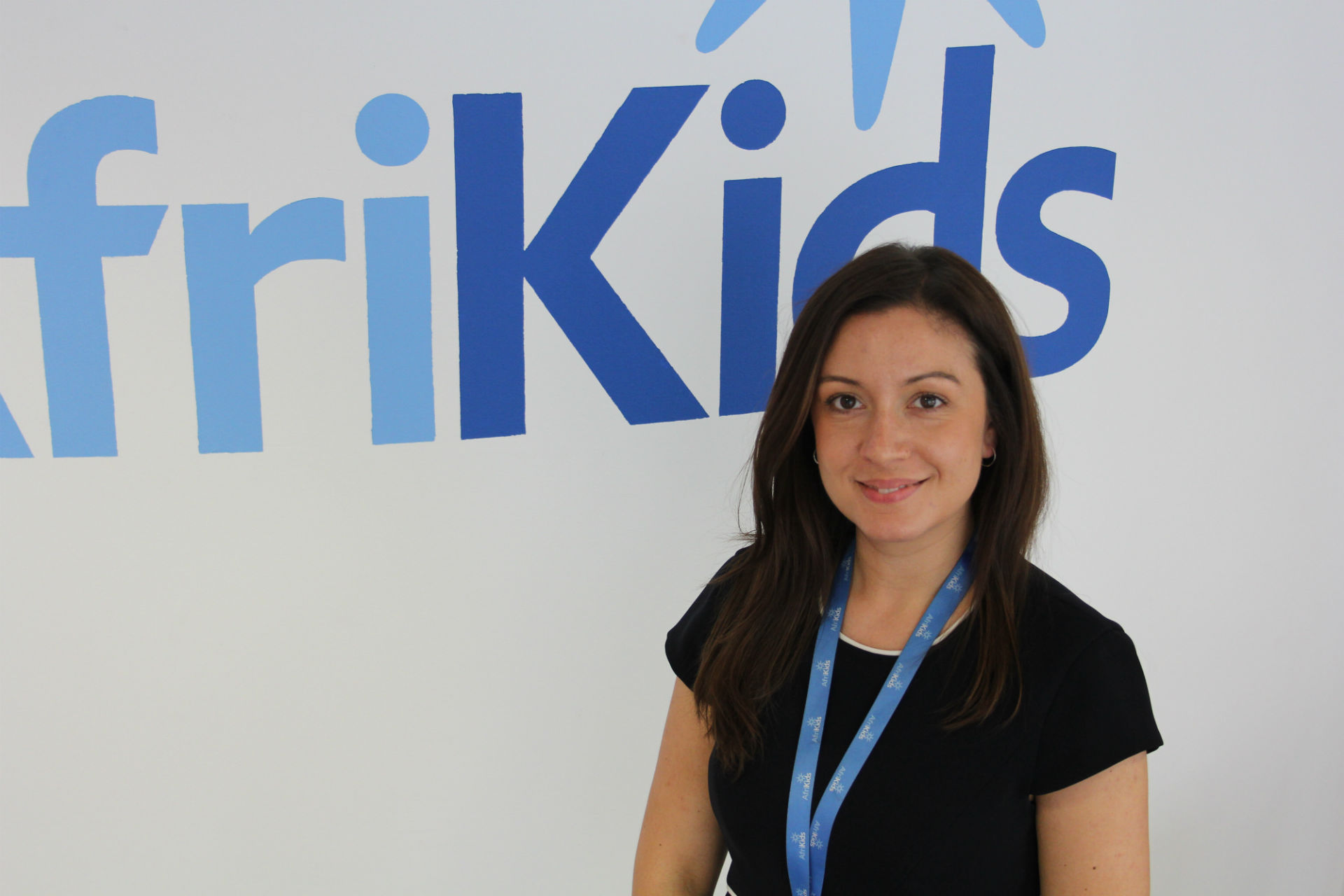
Location: London
Current job: CEO
One word that best describes how you work: Catalystic
Favourite website: Google/Google Earth
First of all, tell us a little about your background and how you got to where you are today.
A VSO volunteering programme took me to northern Ghana in 2009 where I discovered AfriKids (both through volunteering and as a patient at the AfriKids Medical Centre!). I quickly fell in love with this amazing organisation and the incredible work it does changing children’s lives and so when I returned to the UK, I joined the London team as an intern. As part of a small team, I’ve worn many hats over the years, but I was thrilled to became Chief Exec in 2018 and tomorrow will be celebrating my 10th anniversary at AfriKids.
Take us through a recent workday.
No two days are ever quite the same but in the last week I have spent a lot of time on the phone with my colleagues in Ghana working on our ambitious new strategy for 2021-2025 and finalizing budgets and plans for this year; recruiting new staff to the UK team; and having meetings with our wonderful patron Baroness Chalker, a few of our amazing donors and other CEOs/peers/mentors for shared learning and to discuss collaboration.
How do you discover new ways to innovate in your working day?
I make a lot of time to listen and learn from others – reading sector news, meeting peers, catching up with my team, attending workshops and seminars and generally trying to step back and remember “the point” of it all – why AfriKids exists and what else we can do to “make the boat go faster” towards our ultimate goals. My colleagues in the UK and Ghana are phenomenal and we share a genuine passion and commitment to our cause over our organisation, which means there is a really strong culture for trying new things, taking risks and hearing everyone’s ideas for how we can continue to evolve and grow. We have made a lot of big changes over the last couple of years and everyone has really embraced and been a part of them which makes it so much easier to try new things quickly and constantly improve.
What is the next big thing in the charity sector?
I think we’ll see a lot more collaboration and partnership as everyone (in and outside of the sector) is thinking in an increasingly global and integrated way, especially around some of the issues we’re trying to tackle. At AfriKids we’re making this a priority under our new strategy, recognising the value of partnerships across all areas of our work – from funding to programmes delivery – to have an even greater impact and ultimately, to see Ghana able to secure the rights of every child sooner.
How do you measure success?
Big smiles! Our strapline is “bringing big smiles to little faces”, and ultimately our work is successful when children are happy, healthy, safe and in school. But achieving this relies on working effectively with everyone it takes to make real and lasting change possible. The AfriKids team being happy and supported to deliver their best means they give us their best, so I’m really big on training, development, recognition, opportunity and support with work/life balance. My own experience of being encouraged and supported to rise through the ranks at AfriKids has taught me that people are usually capable of more than they realise, given the chance and a bit of faith, so I try to empower my team in the same way and they continuously amaze me (and themselves!). Our donors having an amazing experience with us and our project stakeholders (including communities and children themselves) being involved and valued is also critical to our success and when all of these people – everyone it takes – are happy and actively supporting us, the traditional metrics of success (business KPIs) reflect that.
How do you recharge? What do you do when you want to forget about work?
Big walks, time in nature, cooking, learning new things (I’m a total nerd – courses, talks, exhibitions) and watching what is probably an unhealthy number of murder mysteries.
What are you currently reading, or what’s something you’d recommend?
It’s always my new year’s resolution to read more and so far this year I have read Stephen Fry’s Mythos, Everything I Know About Love by Dolly Alderton and The Bell Jar. None of them work-related but I would recommend them all! And I’m one of the thousands of annoying people who can’t help telling everyone to read Sapiens (if you haven’t, do!)
Fill in the blank: I’d love to see ______ answer these same questions.
Mark Waddington, Hope and Homes
What’s the best advice you’ve ever received?
At work – if you wouldn’t want to see it on the front of a newspaper, don’t do it.
Is there anything else you’d like to add that might be interesting to readers?
We can help you to optimize your Cause Marketing, enhance your Brand Presence and give you targetted education with our Marketing Workshops.

